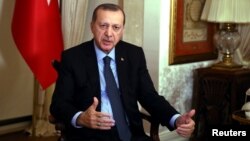Over the weekend, Turkey's ruling AK Party submitted to parliament a package of 21 constitutional reform proposals that would end the country's nearly century-long parliamentary rule and replace it with a powerful executive presidency.
“The draft grants the president the authority to issue decrees, to declare a state of emergency and rule the country with resolutions during the state of emergency, and appoint public officials as well as half of the high judges,” said law professor Istar Gozaydin. “So it's a huge authority.”
Under the proposals, parliament can pass legislation overturning decrees issued by the president, but the president will have the power to veto parliamentary legislation. The proposals will also allow a president to lead a political party, ending the present constitutional requirement of neutrality.
Running the economy
President Recep Tayyip Erdogan has been pushing for the sweeping reforms, arguing that the current challenges facing the country require a strong presidency. Erdogan also claims the changes would end the risk of weak coalition governments that dogged Turkey throughout the 1990s, a period characterized by economic crisis and political violence.
Analysts argue some of the most controversial proposed presidential powers concern running the economy.
“Erdogan will essentially control the central bank,” said political consultant Atilla Yesilada of Global Source Partners. He noted that under article 15 of the proposals, the president can appoint everyone working for public institutions, including regulatory authorities.
“One of key tenants of a modern economy is central bank independence and independence of regulatory agencies, such as the capital markets board,” he said. “[This] will also be thrown overboard.”
Centralization of power
The proposed constitutional reforms will also empower the president to choose ministers and set the budget. According to Yesilada, such a centralization of powers is a cause for concern.
“The whole idea of modern management is proper delegation,” Yesilada said. “I don't think Mr Erdogan can deal with so many tasks, and knowing the caliber of his current advisory team, I am afraid if the referendum passes and the new system is instituted, policy making in Turkey would be completely haphazard and completely unpredictable, and that's really scary.”
Questions are also being raised over how many terms a president will be able to serve under the new reforms. While the proposals limit a president to two consecutive terms, experts note they also say that if an incumbent calls an early presidential election in their second term, they can stand for another term, opening the door to indefinite rule.
“This may just go on over and over as long as he or she lives, so that practically turns into a dictatorship in a way,” said Gozaydin.
But Erdogan argues such powers are key to meeting his government's goal of making Turkey one of the 10 largest economies by 2023, the hundredth anniversary of the creation of the Turkish Republic.
Proposals strongly opposed
The main opposition Republican People's Party and the pro-Kurdish HDP have strongly condemned the proposals, warning they are tantamount to turning the country into an elected dictatorship. But the ruling AK Party, backed by members of the junior opposition MHP, has enough votes to secure the required three-fifths parliamentary majority to pass the constitutional reforms, although observers point out the vote will be secret, making it easier for some deputies to rebel.
If the reforms are passed, they will be put to a referendum within three months, which is widely predicted to be a deeply polarizing vote.
A referendum, if called, will likely dominate Turkey's political agenda. “For him [Erdogan], the utmost priority seems to be to engineer or design a campaign that would allow a large enough majority to back the presidential system,” said Sinan Ulgen, a visiting scholar at the Carnegie Institute in Brussels.
Opinion polls Turkey have historically found little support for an executive presidential system. But recent polls indicate growing support for the initiative, with some showing a majority backing it: a poll this month by an agency closely linked to the ruling AK Party found 60 percent in favor.





